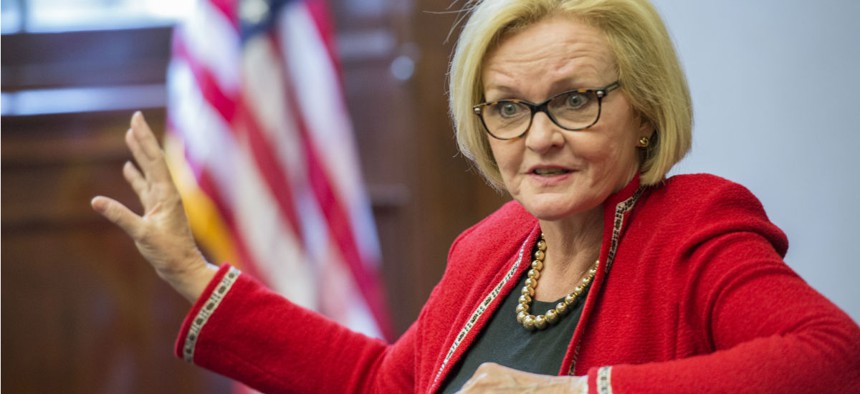
Sen. Claire McCaskill, D-Mo., requested the report. Flickr user Senator Claire McCaskill
Watchdog: IGs Should Improve Grading of Agencies for Improper Payments
GAO says inconsistent reporting risks use of misleading data on waste.
Inspectors general, tasked with reporting on how major agencies are following the laws aimed at curbing improper payments, are inconsistent in how they evaluate compliance, the Government Accountability Office found.
Cumulatively the watchdogs found that 15 of the 24 major federal agencies in fiscal 2015 fell short of adhering to procedures for reducing the estimated $136 billion in unmerited payments that go out under such programs as Medicare, Medicaid and the earned income tax credit. But inconsistencies by the IGs themselves governmentwide “may present misleading information,” GAO said in a report to Sen. Claire McCaskill, D-Mo., ranking member of the Homeland Security and Governmental Affairs Committee.
“Specifically, certain IGs reported compliance based on the presence or absence of the required analysis or reporting, regardless of whether the IGs identified flaws, whereas certain other IGs reported agencies as noncompliant based on their performance of some degree of evaluative procedures to determine whether the analysis or reporting that the agency produced was substantively adequate,” the report said.
The 2010 Improper Payments Elimination and Recovery Act sets out a regime of enforcement measures for agencies found by the inspectors general to be out of compliance. As the number of consecutive years of non-compliance increases, agencies graduate from submitting an action plan to Congress, to a review from the Office of Management and Budget to determine if additional funding would help bring a program into compliance, to a requirement that the agency send a reauthorization proposal to Congress or request statutory changes to the problematic program.
In the new report, seven agencies, affecting a dozen large programs, were found noncompliant over the three preceding years: the departments of Agriculture, Defense, Health and Human Services, Labor and Treasury, along with the Small Business Administration and the Social Security Administration.
Neither the 2010 law nor guidance from OMB specify the methodology IGs should use for evaluating compliance, GAO noted. The Council of the Inspectors General on Integrity and Efficiency has not made specific recommendations either.
GAO did not suggest that improper payments were a low priority for IGs—in the aggregate the watchdogs from fiscal 2011-15 made 425 recommendations to their agencies for improving efforts to reduce unmerited payments, 320 of which were implemented.
The congressional watchdog recommended that the OMB director coordinate with the inspectors general council on new guidance to render the evaluation of improper payments countermeasures more consistent. It also singled out the Agriculture Department for failing to submit an overdue proposal to become compliant with the law.
OMB did not respond to the draft report, while the inspectors general council agreed to coordinate with the White House budget office. Agriculture also agreed to send a report to Congress.







